Dementia device seeks 100 people for further trials
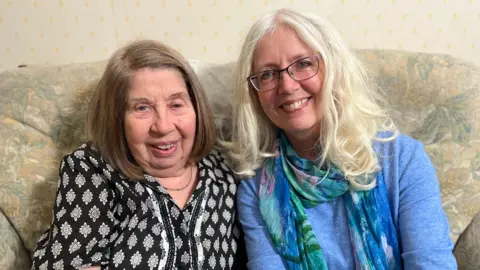 BBC
BBCA start-up company is searching for 100 people living with dementia to pilot a new device which could help them retain their independence.
Supersense Technologies of Cambridge is developing what it calls a unique monitoring system which works without cameras or microphones.
The SenS2 hub is one of five devices on the shortlist to win the Longitude Prize on Dementia – an international competition for new technology for those with the disease.
Research for the competition found that most GPs believe independence and the ability to remain at home helps those with dementia to live longer.
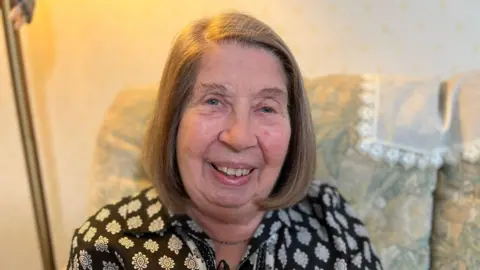
Maggie, 83, who lives in Cambridge and has five children, she said she had "always been independent", but now she has dementia "losing my independence isn’t nice".
She said she knew she needed some help but found the prospect of having carers visit her home several times a day "upsetting", and she and her family agreed to pilot the device being developed by Supersense Technologies.
The SenS2 hub is a small, plug-in box which can monitor Maggie’s movements and the conditions in her home and report back to her children.
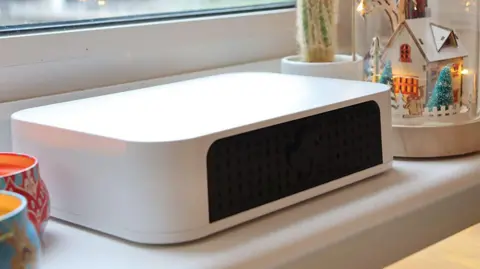 Supersense Technologies
Supersense Technologies"It's made a huge difference to the whole family," said Maggie's daughter, Lucy Gardner.
"I get a message each morning to say that mum is up and the heating is on.
"It might say that she's been up a lot during the night and so, even if she can’t remember or communicate that to me, I can talk to her to see if anything’s wrong.
"It means she can go about her mornings as she sees fit, without us badgering her".
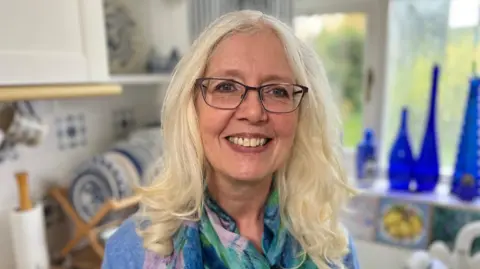
The prize is funded by Alzheimer's Society, Innovate UK and Challenge Works. It awards a share of £4.4m to teams developing technology.
Supersense Technologies wants more families to pilot its device to advance its research.
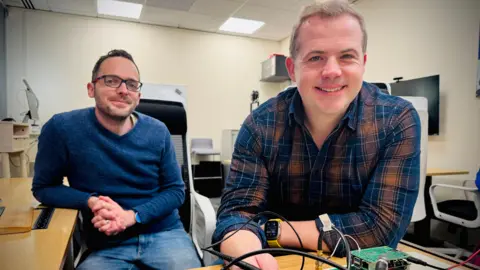
"Everyone experiences dementia differently... and all homes are different," said Supersense co-founder Dr James Brown.
"Collecting data is really important, so we can understand the needs people have and develop the algorithms to support the personalised service.
"It's key for us to be able to interpret the data and give it to families in a way they understand.
"Artificial intelligence will help us to do this."
Each of the five finalists has received £300,000 to improve their product before the judges announce a winner in 2026 and Supersense wants to develop enough hubs for 100 homes.
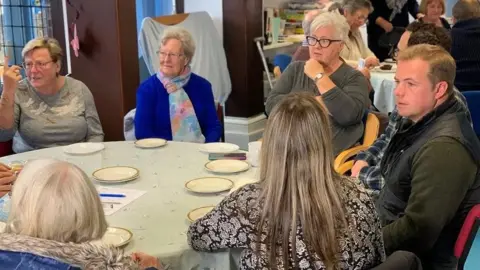
"Our first device relied on sensors around the house to feed information back to the box, but now we can monitor everything from this single unit," said Dr Matt Ash, Supersense co-founder.
"I've tested it in my own home and you could clearly see when we put the children to bed, when they woke in the night, when we were up again having breakfast and when the heating came on."
Dr Ash's own mother has dementia and the device was born out of a desire to help families like his own.
"One winter, mum didn't have heating on for two weeks because she didn't know how to tell us it was broken," he said.
"We live far away and we want her to retain some independence, but we don't want her getting into difficulty without us knowing."
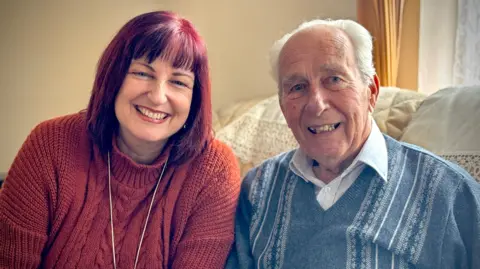
In Norfolk, 83-year-old Michael was diagnosed with dementia in 2023.
As a former mechanical engineer, he was happy to trial the new technology and so his daughter, Tina Cleveland, signed up for him to have it in his home in Gorleston-on-Sea.
"It was a no-brainer for me," said Mrs Cleveland.
"The fact it doesn’t need wi-fi was great for us because dad doesn’t have any, but it was also important to have no cameras.
"I don’t want dad to feel uncomfortable."
Michael felt the loss of independence when he stopped driving, and wants to look after himself for as long as possible.
He needs labels on the cupboards to remind him what is inside but, with the support of his daughters, is managing in his own home.
"I want to continue as we are, because I’m happy," he said.
About one million people in the UK live with dementia, a figure projected to rise to 1.4 million by 2040.
Simon Lord, head of innovation at the Alzheimer's Society, said: "AI-driven technology has huge potential to help people living with dementia stay active and independent.
"As well as helping individuals maintain their sense of self, it can also help alleviate the economic and emotional demands of a person’s care.
“That’s why Alzheimer’s Society helped to fund the prize.
“As well as Supersense, the finalists include smart glasses to help recognise objects and a traditional telephone device that reminds users of their daily routine.
"I look forward to seeing how all of these innovative technologies continue to develop between now and 2026."
Follow East of England news on X, Instagram and Facebook: BBC Beds, Herts & Bucks, BBC Cambridgeshire, BBC Essex, BBC Norfolk, BBC Northamptonshire or BBC Suffolk.
